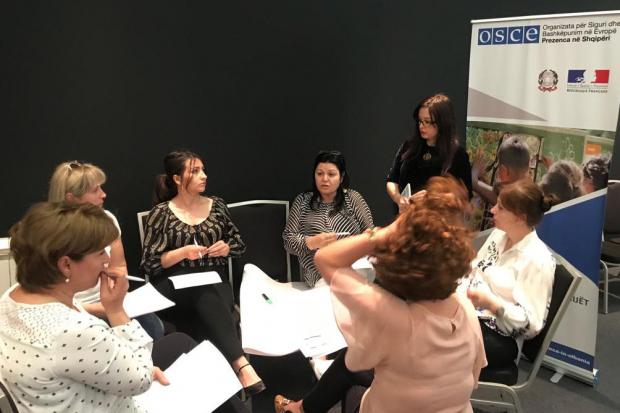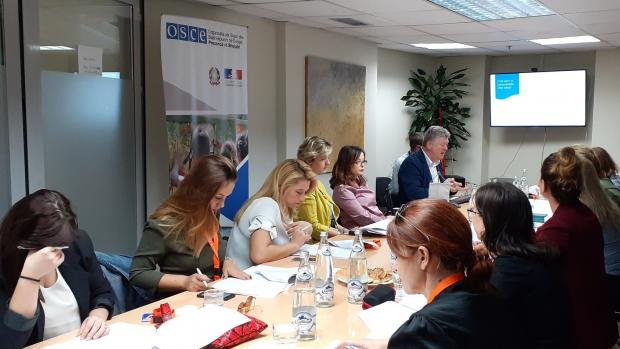Addressing child trafficking and child protection in Albania
“Our priority is to combat trafficking in human beings and contribute in putting an end to this horrific phenomenon,” begins Juliana Rexha, National Anti-Trafficking Officer from the OSCE Presence in Albania.
She explains that the Presence co-operates with local organizations to ensure effective co-ordination and prevent overlapping of efforts and duplication of measures in combating trafficking in human beings (THB).
Combating THB so far
“The OSCE Presence has developed and implemented projects that address child trafficking,” says Juliana. “We focus on the best-interest-of-the-child approach. We work with policy and legislative development, and inter-institutional co-ordination and capacity building to protect current and potential victims.”
Juliana says that by pointing to horrific children’s forced and organized begging as a form of exploitation and trafficking, the Presence focuses on enhancing the capacities of child protection units, police, and social workers, to provide a prompt response to the particular needs of children in forced begging.

“We provide support to the State Agency for the Rights and Protection of the Child (SARPC) and the Tirana municipality to co-ordinate the work of the local child protection units to identify child victims of trafficking and those subjected to forced begging,” she says.
Inter-institutional co-ordination making a difference
In March last year, the Council of Ministers, with the Presence’s technical support, passed a decision on the protection of children from economic exploitation, creating procedures for the identification and referral of child labour cases from the Labour Inspectorate to Child Protection Units.
“To bolster its implementation, the OSCE Presence supported the State Labour Inspectorate to finalise a methodology to train labour inspectors how to monitor children’s work and co-ordinate with the appropriate institutions, such as police and child protection workers, when they suspect child labour,” says Irida Qosja, Chief of Labour Relations in the Albanian State Labour Inspectorate.

Rovena Voda, Albania’s Deputy Minister of Interior and National Anti-Trafficking Coordinator, says that the OSCE Presence in Albania is a strong advocate of a comprehensive, human-rights-based approach to combating trafficking in human beings.
“Thanks to the Presence’s expertise and support, we have been able to advance our anti-trafficking commitments and give due consideration to the most vulnerable groups, particularly to children.”
Under the motto ‘Implementing our commitments together’, Albania’s OSCE Chairmanship 2020 focuses on enhancing security against contemporary threats and challenges, including human trafficking.
Rovena VodaAlbania’s Deputy Minister of Interior and National Anti-Trafficking Coordinator
What statistics say
During 2019, the Presence started an in-depth analysis of the cases of child trafficking and children at risk of trafficking. Based on findings, a report on the profiles and typology of child trafficking and children at risk of trafficking will be issued in early 2020.
“This research will map the risk factors that influence the likelihood and particular vulnerabilities of children becoming victims of trafficking,” says Juliana.
The Presence also supported the development of a National Action Plan for the protection of children from economic exploitation, which the Ministry of Health and Social Protection signed in October 2019.
“The National Plan is complemented by seven local action plans on the protection of children from economic exploitation and the workflow of institutions’ responsibilities for the identification and referral of, and assistance to children subject to economic exploitation,” says Deputy Minister Voda.
Training and development work
Recognising the intricate and evolving aspects of the child trafficking phenomenon, the training of central and local level professionals has been at the heart of the Presence’s activities.
“Ensuring a human rights-based approach to victims of trafficking during all stages of communication between a trafficked person and state officials is a major precondition for effective investigation and prosecution,” says Juliana. “The Presence has supported training for around 100 district level judges and prosecutors over the last two years on the rights of victims of trafficking in the judicial process. We developed a guideline for safeguarding the best interest of child victims of trafficking and exploitation in criminal proceedings.”

In 2019, the Presence organised multi-disciplinary training workshops for 57 child protection officers and police in Tirana, while also supporting on-the-job training for child protection workers on the social and psychological assistance of children victims of trafficking.
Children’s protection
Children in migration flows, particularly unaccompanied minors, who are particularly vulnerable to human trafficking and sexual exploitation, have been part of the focus of the Presence’s work.
“Last year, we co-operated with UNHCR to support the authorities in drafting new procedures for the pre-screening of irregular migrants,” says Juliana. “Aim was to enhance the role of the child protection units throughout the process of identification, referral, and assistance to migrant children.”
With its partners, the OSCE Presence has worked alongside the Ministry of Health and Social Services and SARPC to organize a conference in support of child protection workers, with more than 150 child protection workers participating.

Juliana says that the basis of this co-operation resides in an agreement signed in May 2018 by the Presence with UNICEF, Save the Children, Terre des Hommes, and World Vision, which facilitates joint training, advocacy, and awareness-raising activities.
“The Presence also hosted a national event with the International Labour Organization calling for Albanian institutions to accelerate progress to address trafficking in human beings and child labour,” says Juliana.
The Presence leads the donors’ coordination in anti-trafficking issues and holds the advisory role in the National Referral Mechanism for Victims of Trafficking, by ensuring compliance with the numerous OSCE anti-trafficking commitments and recommendations.
Juliana RexhaNational Anti-Trafficking Officer from the OSCE Presence in Albania
“We believe that by deeper discussion of all relevant parties responsibility will naturally spread, awareness will raise and a stronger child protection system will be in place,” says Juliana.

